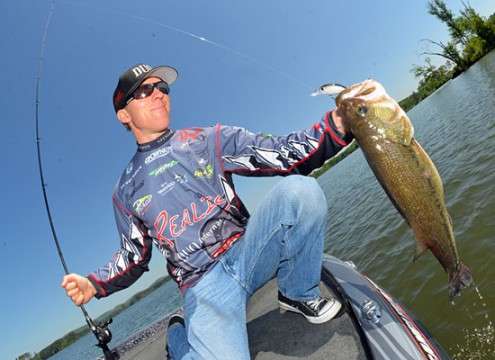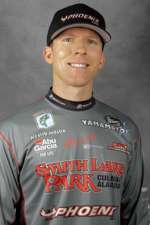
I had high expectations for myself coming into my first season on the Bassmaster Elite Series, but was quickly humbled after failing to make a top 50 cut in each of the first five tournaments. I did my best to rebound the second half salvaging a 28th place finish at the Mississippi River following a fast day one start, and a season high 9th place finish at the St. Lawrence River, but it wasn’t enough not to feel embarrassed and disappointed with my overall performance.
My Way
My dad gave me a piece of advice at a young age that I’ll never forget. He said, “Don’t ever count on anything being handed to you. You have to work hard for everything you want in life.” I can tell you it takes hard work to compete on the Elite Series, and there’s no guarantee hard work will win a tournament, earn a check, or translate into a prosperous career. However, working hard is the only way I’ve ever succeeded at anything, so it’s how I go about my business. I know if I don’t work hard I’ll have zero chance at reaching my potential. Sure, I’ve tasted success. Winning the 2010 Forrest Wood Cup comes to mind, but I don’t consider myself as successful as I could be — not even close. That’s why the Cup stays tucked away in my closet. It’s not that I’m not proud of it, because I am, but keeping the Cup out of sight helps me stay hungry — hungry to achieve a level of success I haven’t yet tasted.
I’m a big believer in figuring out what works best for you, whether it be experimenting with eating different foods to determine which ones make you feel and look your best, or the daily routine and habits you create to be the most efficient and productive person you can be. Everyone is different. What may work for some may not work for others. Compare Toyota Bassmaster Angler of the Year winner Aaron Martens to runner up Edwin Evers. Aaron always seems to catch them with small plastics and a spinning rod in his hand, even on traditional power fishing venues like the Mississippi River, while Edwin is more of a typical power fisherman, relying on jigs and reaction baits. Aaron and Edwin employ two drastically different approaches, yet finished one and two in AOY points. This proves there’s no one right way to go about tournament fishing, but rather it’s a process of figuring out what gives you the most confidence and ultimately the best results.
10,000 Hours
It takes time on the water to become a better angler. In Malcolm Gladwell’s book Outliers: The Story of Success, he says you need 10,000 hours in a subject to be a phenom. “To be so freakishly awesome, to be such a standout among your peers, that sometimes our first name is enough to tell people who you are: Peyton. Tiger. Venus. Kobe. Oprah.” Reaching 10,000 hours on the water would require fishing 150 days per year, seven hours per day, for almost 10 years. That’s a considerable amount of time, but certainly not out of the ordinary for some full-time tournament anglers. So why aren’t there more anglers who fit the phenom category? I think in order to be a fishing phenom (Kevin and Skeet immediately come to mind) it takes much more than just time on the water. It takes thought, experimentation, imagination, confidence, and courage (to name a few) to outperform everyone else at the highest competitive level.
Commitment
I’ve learned for me to get good, really good, at something I can’t just dabble in it. I have to immerse myself. I’ve always loved to bass fish and started fishing tournaments shortly after graduating high school, but I had other interests growing up as well. I lived on the beach and went body boarding when the waves were good. I spent too much time in the gym trying to be Arnold. I had multiple jobs. It wasn’t until I won the Cup in 2010 that I turned my focus to full-time tournament fishing. I feel I’ve made significant progress since then by dedicating my time solely to bass fishing, and competing against some of the most talented tournament anglers on Tour. However, I know there are areas of my game I need to continue to work on, in order to reach the level I know I’m capable of reaching.
Rethinking My Approach
I’ve always placed a lot of emphasis on consistency, but after seeing how much of an impact a win can create I’m rethinking my approach for next season. Not only does a win carry the biggest cash prize, but it also provides the most exposure for an angler and his sponsors. I do believe there’s one distinct difference between the two approaches — having an uncanny amount of courage. Sometimes it means being willing to cover more miles than every other competitor (like Brandon Palaniuk did at the St. Lawrence River), or it can be finding a backwater overlooked by everyone else (like Todd Faircloth at the Sabine River). It can be scary to gamble like Brandon and Todd did knowing the amount of uncontrollable variables dramatically increases when making a long run or accessing skinny water. There’s an increased chance of breaking down, or getting stuck and not making it back to weigh in. But, as I’ve stated before, the biggest risks often carry the biggest rewards. It’s going to take some mental work for me to change my approach, but I know I have it in me.
The Support Crew
Having a solid support crew in place is important in everyone’s life, especially a full-time tournament angler. Prior to leaving for the first Elite tournament on the Sabine River, I made arrangements to travel and room with my friends and fellow Elite Series anglers, Chad Pipkens and Brandon Card. I can’t tell you how helpful it is to travel with two guys who you can trust like your own brothers. Brandon (the funniest guy I know) provided the comic relief all season with his jokes, and Chad (the most positive person I know) kept everyone’s morale up when we had a miserable practice day or a rough tournament. Traveling three deep also made it feasible for us to rent houses at a lot of the events rather than having to stay at hotels. Rental houses provided us some of the comforts of home, which goes a long way when traveling.
Family and friends are a big part of my support crew as well. Like any other profession requiring a lot of traveling and being away from home, tournament angling can get lonely sometimes, so I take advantage of the time I spend driving by talking to the people closest to me (hands free, of course) traveling from tournament to tournament. There are also the random acts of kindness shown by people who helped us in many different ways throughout the season. On more than one occasion, Brandon, Chad, and I had strangers invite us into their homes and provided us with a warm place to stay, amazing home cooked meals, and the company and conversation we’re accustomed to having when we’re home with our family and friends. We try to show our gratitude the best way we know how, but I think most of the people who help us out along the way just want us to pay it forward. So we try our best to do so.
It’s difficult to maintain a full-time tournament fishing career without sponsors. This season I worked just as hard off the water as I did on taking a proactive approach to provide as much exposure and help strengthen brand awareness for my sponsors as I possibly could. I want to show them the value I can provide, and build a long-lasting and mutually beneficial relationship with them.
The Season Ahead
I’m setting my goals high again for this coming season, and I won’t let myself perform as poorly as I did this year. Now that I’m fishing on the Elite Series, not only do I want to stay here, but I want to succeed at the highest competitive level. I’m going to continue to go about my business the only way I know how — by working hard.
Reprinted with permission from InsideLine.net.

